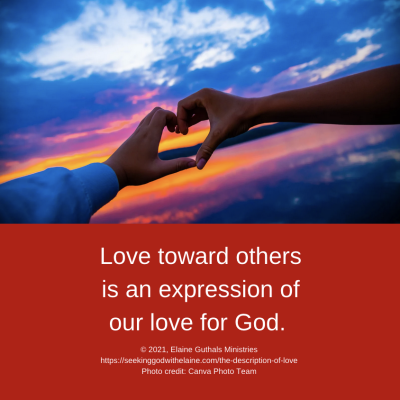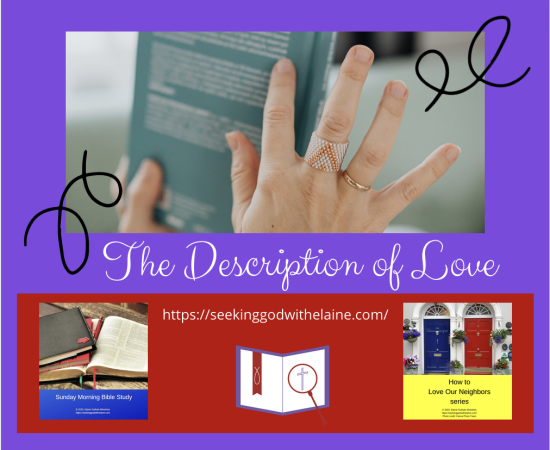Love is complex. This daily devotional looks at what love is and isn’t.
Nuggets
- Love is complex.
- Love remains in character when provoked.
- Love is kind in mind and in actions.
- Envy is the opposite of being content.
- Love eliminates boasting by changing pride to humility.
- Love helps us to maintain a realistic view of ourselves, giving us the right amount of self-respect.
- Love calls us to be polite and fair, not rude.
- Looking to always get our own way is selfishness, not love.
- Love has no room for bitter resentments.
- Love is not suspicious.
Devotions in How to Love Our Neighbors series
Paul wanted us to know exactly what love is and isn’t. He gave us a whole list of components that make up love.
Sometimes, Paul focused on the positive of love. Other times, he showed us that for which we don’t want to aim.
All in all, Paul did a pretty good job of breaking down the complex concept of love. Let’s take a look.
Let's Put It into Context
Here is a running list of nuggets for the series.
The Beauty of Love
“Love is patient and kind; love does not envy or boast; it is not arrogant or rude. It does not insist on its own way; it is not irritable or resentful” (I Cor. 13: 4-5 ESV)
Love is complex.
Try to explain what love is to someone. It is all but impossible to do it with one word.
That is because it has aspects that make up the other spiritual graces. We talked in the last devotion about how the other spiritual graces have no value without love. They all have to coexist.
Paul’s list shows us what is beautiful about love. It also talks to us about what sows discord.
One benefit of love is that it gives us hope. “This hope will not disappoint us, because God’s love has been poured out in our hearts through the Holy Spirit who was given to us” (Rom. 5: 5 CSB).
Love toward others is an expression of our love for God. Because we love God, we become docile. We allow Him to teach us what we need to know because we trust Him. We want others to have what we have.

Let’s look at the different aspects which describe what love is and isn’t.
Patient
Love remains in character when provoked.
Ooo, baby. We don’t want suffering to have any acquaintance with love!
But this is life. Things happen to upset our apple cart. People are unkind to us and oppose us. We are injured — both our feelings and physically.
How we react when bad things happen shows who we really are. Do we react with complete confidence in God? Or do we break character and worry instead of putting our faith in Him?
Taylor talked about holding the mind. That is an interesting way to put it.
Resource
We can’t give up on love. Things will get tough. We won’t always feel God’s presence.
We can’t chuck it all. We have to keep our mind focused on God.
We can describe patience a lot of different ways. Pratt wrote, “This is almost identical with ‘not easily provoked,’ ‘beareth all things,’ ‘endureth all things.’ These manifold expressions reveal love as a personage of great moral strength, as well as of unrivalled [sic] loveliness.” Thomas also linked patience with gentleness, unsuspiciousness, tolerance, and forgiveness.
Resource
When we are patient, we conduct ourselves with dignity for ever how long it takes. We are sober and even keeled.
Glossary
Being patient isn’t a weakness. It doesn’t show that we are spineless or indifferent.
It shows that we have the character of God. Jesus was patient.
Patience shows meekness. Meekness is a personality trait exhibiting a mild or moderate disposition that places dependence on God.
Glossary
To read a related devotion, click the button below.
Kind
Love is kind in mind and in actions.
When we think about being considerate and generous, we have to do more than do that. We have to be that.
Kindness is an inner beauty that shines through. It encompasses gentleness and goodness.
This isn’t an option for disciples. We have a duty to be kind.
If we are doing something kind for someone, our thoughts have to match. We really aren’t being kind — the way God wants us to be — if we are performing a task but wishing we could be anywhere but. Or if we are thinking the person we are doing it for doesn’t really deserve it.
Pratt had a great way to describe kindness. He wrote, “Her self-forgetful love makes her gracious, benignant, generous, and forgiving under all circumstances.”
Resource
There are many benefits to being kind. Also, it does go a long way to help us being forgiving.
To read a related devotion, click the button below.
Envy
Envy is the opposite of being content.
God doesn’t want us to see what others have and be envious. The churchy word for that is covetousness. Covetousness is an inordinate greed for wealth and possessions.
Paul could relate to that. He told us that he battled covetousness.
The problem with envy is when we don’t limit it to that. It may lead to lying, stealing, unfairness, and cruelty. We allow our selfishness to run rampant.
God doesn’t want us to make it into a competition with others. He wants us to evaluate our lives against His standards.
Envy is the polar opposite of what God wants because, Cross noted, it encompasses an element of hate.
Resource
Envy can quickly steal our joy while it, at times, paints an unrealistic picture. It is an example of another time that we need to keep our focus on God.
To read a related devotion, click the button below.
Devotions in the Contentment Leads to Tranquility series
Boasting
Love eliminates boasting by changing pride to humility.
Love isn’t delusional. It sees things for what they are.
Instead of having an undue pride, we are humble. Christian humility is our yielding our dependence to Christ to serve Him and others.
This also has an element of modesty. The counterpart of that is vanity.
Lyth said this smacks of not having care for others’ feelings.
Resource
We should never forget that everything we have — including our knowledge, skills, and abilities — comes from God. We would be nothing without Him.
Arrogant
Love helps us to maintain a realistic view of ourselves, giving us the right amount of self-respect.
It is a balancing act. We are to be humble and kind instead of boastful and arrogant.
Too often, the problem when we build ourselves up is that it is at the expense of someone else. We are tearing them down to show how good we are. Or we want them to see how good we are.
Yep, we are full of vanity and pride.
That is the exact opposite of how Jesus taught us. “But when you give to the needy, do not let your left hand know what your right hand is doing, so that your giving may be in secret. And your Father who sees in secret will reward you” (Mt. 6: 3-4 ESV).
We shouldn’t be doing acts of service so all of our friends and family pat us on the back. We should be doing them so God alone sees them.
Rude
Love calls us to be polite and fair, not rude.
It isn’t just attitude. It is behavior. Love wants us to be considerate of others’ feelings.
But it is also more than that. This is where discernment fits in. Discernment means we can evaluate the situation and recognize right from wrong. We can take that a step further to say act appropriately.
We are called to honor others. Honor means to esteem and respect another because of a good reputation.
Own Way
Looking to always get our own way is selfishness, not love.
Selfishness stifles a generous heart. Instead of looking to others, we look to number one.
We are looking for our own pleasure and honor. We want to get a leg up.
God wants us to focus on others in His name. He calls us to be self-sacrificing and merciful.
I like what Wilkinson had to say. He wrote, “Charity seeks charity, or God, who is Love. It cares little or nothing for aught else. It knows that all the rest will come in time.”
Resource
We can’t go to the other extreme and think we are to hate ourselves. That isn’t what is wanted here.
We need to love ourselves as God loves us. We also have to love others as God loves us.
Irritable and Resentful
Love has no room for bitter resentments.
This goes back to being sober and even keeled. We need to be calm and not easily provoked.
We keep our anger in check. It shouldn’t smack of revenge or be unwarranted. We should not blow things out of proportion.
Our temper can sometimes stem from our selfishness. We’ve already talked about that being contrary to love.
The King James Version translates this as being provoked. That does bring with it another connotation.
Satan is trying to get us to fly off the handle. He is trying to get us to react to the trial instead of focusing on God.
That brings with it the possibility of the anger being ungoverned. God doesn’t want that. He wants us — and Him — to be in control.
Thinking of Evil
Love is not suspicious.
The King James Version translates the end of verse 5 a little differently than the English Standard Version. It reads, “… thinketh no evil” (I Cor. 13: 5 KJV).
Love doesn’t think the worst of others. It doesn’t harbor resentments.
Well, that tracks. We just said that we need to love ourselves and others as God loves us.
God is forgiving, not resentful.
We also don’t want to see faults in others that aren’t there. Unfortunately, we have a tendency to see things from our perspective, not from realities’ viewpoint.
We have to slip out of our own little word and lead with kind thoughts of others.
Wilkinson defined thinking evil as judging others. We aren’t supposed to judge others.
Resource
I know. We do it anyway.
However, it is above our pay grade. Only God can truly judge others.
The churchy word for this is censoriousness. Censoriousness means being critical of others.
Usually when we are critical of others, we are overlooking their good qualities. We can’t see the good for the bad.
That may be fallout from our pride and building ourselves up.
One way it manifests itself is in gossip. Man, are we good talking about others!
Burrell had a great way to combat this critical attitude. He wrote, “Love puts the best construction on everything it sees.”
Resource
We really have to be careful judging others. Judgments are based on a lot of assumptions. Those assumptions may — or may not — be correct.
Instead of judging, we are supposed to show mercy to others. In reality, we are no better than they are.

Making the Connections
Is it me, or did we talk about the same things over and over? Selfishness stood out to me. Pride did, too.
But then again, we talked about soberness and forgiveness over and over again. Humility and honor came up a lot.
We have to remember that Paul does not limit our actions toward others in any way. This isn’t be polite toward one set of people, but you don’t have to be polite to that set.
We are to love all.
How Do We Apply This?
- Freely show love through kindness.
- Follow the Golden Rule.
- Possess a meek and gentle spirit.
- Strive to offend no one.
- Be humble and modest.
- Seek to please and glorify God.
Resource
Father God. There are so many different ways to show love. Help us to reflect Your love. Amen.
What do you think?
Leave me a comment below (about this or anything else) or head over to my Facebook group for some interactive discussion.
If you don’t understand something and would like further clarification, please contact me.
If you have not signed up for the email daily or weekly providing the link to the devotions and the newsletter, do so below.
If God has used this devotion to speak with you, consider sharing it on social media.
